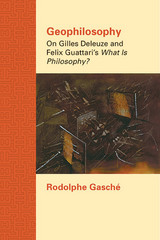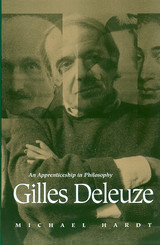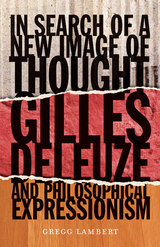
Gasché also intimates that, rather than a marginal issue of their conception of philosophy, geocentrism is a central dimension of their thinking. Indeed, Gasché argues, if all the principal traits that constitute philosophy according to What is Philosophy?—autochthony, philia, and doxa—imply in an essential manner a concern with Earth, it follows that what Deleuze and Guattari have been doing while engaging in philosophy has been marked by this concern from the start.

Beckman follows Deleuze from the salons of his early student years through his popularity as a young teacher to the extraordinarily productive phases of his philosophical work. She examines his life at the experimental University of Paris VIII and his friendships with people like Michel Foucault and Félix Guattari, and she considers how Deleuze’s philosophical developments resonate with historical, political, and philosophical events from World War II to the student uprisings in the 1960s to the Israeli/Palestinian conflict. Beckman ultimately highlights the ways that Deleuze’s legacy has influenced many branches of contemporary philosophy, offering a rich portrait of a contemporary philosopher who wrestled with some of philosophy’s most fundamental questions in fresh and necessary ways.


Although much has been written about Deleuze’s engagement with the arts, Gilles Deleuze and the Fabulation of Philosophy concerns the art of his philosophy. Gregory Flaxman suggests that Deleuze’s notorious rejection of representation gives rise to a singular task—to create new concepts and invent new means of philosophical expression. Tracing this task throughout Deleuze’s vast oeuvre, Flaxman argues that Deleuze’s ambition to think and write “otherwise” constitutes the fabulation of philosophy itself.
For Flaxman, Deleuze’s philosophy is organized around the notion of the friend (philos). This book dramatizes the practice of friendship in Deleuze’s intimate affairs with philosophers—including Plato, Aristotle, Spinoza, Kant, and Foucault—and close encounters with a range of writers, including Homer, More, Kafka, Woolf, and Borges. Flaxman traces Deleuze’s relationship with Nietzsche, the friend from whom he learned to write “in his own name,” to explain how apprenticeship becomes the initial condition of Deleuze’s philosophical method. Detailing the transformation of Nietzsche’s genealogy into “geophilosophy,” Flaxman goes on to show how Deleuze’s philosophy of the earth precipitates his return to ancient Greece and induces his resolution to overturn Platonism. In this spirit, the book demonstrates Deleuze’s evocation of the “powers of the false” by examining how, in his battle against representation, he makes fiction the basis for a minor philosophy. This first volume draws to a close with a timely elaboration of Deleuze’s avowed, if enigmatic, “style as politics” in an age when capitalism and communication challenge the claims of philosophy as never before.
A stunning and original contribution, Flaxman’s book restores the question of aesthetics to Deleuze’s thinking and writing. Gilles Deleuze and the Fabulation of Philosophy not only revitalizes our sense of the philosopher but revises the sense of his philosophy, provoking critical problems and novel possibilities with which readers will wrestle for years to come.

In the first comprehensive English-language introduction to Deleuze, John Marks offers a lucid reading of a complex, abstract and often perplexing body of work. Marks examines Deleuze’s philosophical writings – as well as the political and aesthetic preoccupations which underpinned his thinking – and provides a rigorous and illuminating reading of Deleuze’s early studies of Hume, Nietzsche, Kant, Bergson and Spinoza, his collaborations with Felix Guattari, and the development of a distinctively ‘Deleuzian’ conceptual framework. Marks focuses on the philosophical friendship that developed between Deleuze and Foucault and considers the full range of Deleuze’s fascinating writings on literature, art and cinema. This is a clear and concise guide to the work of one of the twentieth century’s most influential thinkers.

Gregg Lambert demonstrates that since the publication of Proust and Signs in 1964 Gilles Deleuze’s search for a new means of philosophical expression became a central theme of all of his oeuvre, including those written with psychoanalyst Félix Guattari. Lambert, like Deleuze, calls this “the image of thought.”
Lambert’s exploration begins with Deleuze’s earliest exposition of the Proustian image of thought and then follows the “tangled history” of the image that runs through subsequent works, such as Kafka: Toward a Minor Literature, The Rhizome (which serves as an introduction to Deleuze’s A Thousand Plateaus), and several later writings from the 1980s collected in Essays Critical and Clinical. Lambert shows how this topic underlies Deleuze’s studies of modern cinema, where the image of thought is predominant in the analysis of the cinematic image—particularly in The Time-Image. Lambert finds it to be the fundamental concern of the brain proposed by Deleuze in the conclusion of What Is Philosophy?
By connecting the various appearances of the image of thought that permeate Deleuze’s entire corpus, Lambert reveals how thinking first assumes an image, how the images of thought become identified with the problem of expression early in the works, and how this issue turns into a primary motive for the more experimental works of philosophy written with Guattari. The study traces a distinctly modern relationship between philosophy and non-philosophy (literature and cinema especially) that has developed into a hallmark of the term “Deleuzian.” However, Lambert argues, this aspect of the philosopher’s vision has not been fully appreciated in terms of its significance for philosophy: “not only ‘for today’ but, to quote Nietzsche, meaning also ‘for tomorrow, and for the day after tomorrow.’”
READERS
Browse our collection.
PUBLISHERS
See BiblioVault's publisher services.
STUDENT SERVICES
Files for college accessibility offices.
UChicago Accessibility Resources
home | accessibility | search | about | contact us
BiblioVault ® 2001 - 2024
The University of Chicago Press









